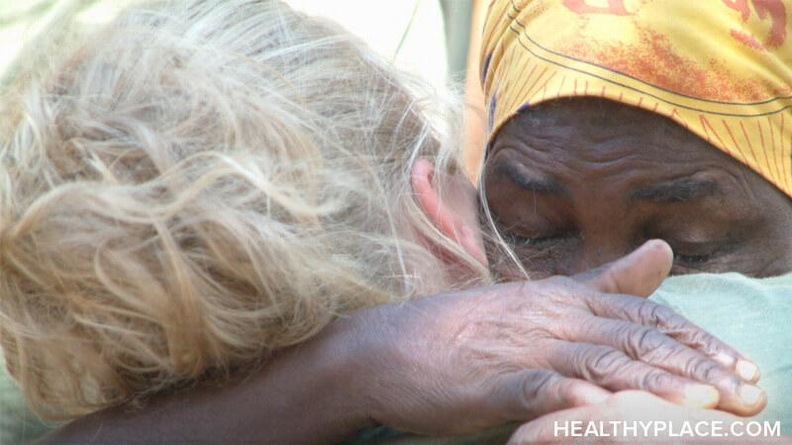Gratitude in the Midst of Trauma: Why Thankfulness Matters

Active trauma memory - a memory that gets triggered, is intrusive, and is invariably painful - will disturb your state of mind, your focus, your ability to be productive, and any sense of hope for the future you may still possess. Put simply, it alters your present perspective on life, and never for the better. Pushing back against such an assault well may seem impossible, but that does not have to be the case. One management tactic of proven value that almost anyone can use is the practice of cultivating a sense of gratitude.
Anxiety Is Fear of an Anticipated Loss
Consider: anxiety is fear, by another name. Especially with people living with unprocessed trauma memory, it is generally an involuntary reaction to an imagined, anticipated event. We see a hostile snarling dog and imagine ourselves getting bit; we then feel anxiety. We look at our bank account, then the calendar, and imagine running out of money a full week before the end of the month; we then feel anxiety. We recall the painful loss of a former intimate with whom we are no longer speaking, imagine a life without any intimates at all; we then feel anxiety.
In all these cases, anxiety is a reaction to an anticipated loss of some kind. Think for a moment: what is the precise opposite of "loss"? Gain, obviously. The best kind of gain involves not an anticipation but a reality - something you already have. Supper is best when it's on your plate; a paycheck is best when it's in your pocket.
Gratitude Counters Anxiety
Gratitude (thankfulness) arises in our awareness when we become aware of this sort of gain. A word rich with implication, it has three fundamental meanings [1]. The first, referring to a state of mind, is of direct interest here: "The quality or condition of being grateful; a warm sense of appreciation of kindness received, involving a feeling of goodwill towards the benefactor and a desire to do something in return; gratefulness."
Trauma Causes Fear, But Gratitude Is the Pathway to Happiness
 That gratitude is a pathway to happiness seems axiomatic. Indeed, it is viewed this way by psychologist Sonja Lyubomirsky, whose research specialty is happiness. Little research has been done on gratitude [2], but what there is has direct implications on how we might want to manage our daily lives.
That gratitude is a pathway to happiness seems axiomatic. Indeed, it is viewed this way by psychologist Sonja Lyubomirsky, whose research specialty is happiness. Little research has been done on gratitude [2], but what there is has direct implications on how we might want to manage our daily lives.
Do some people feel gratitude more easily than others? Our common experience well may suggest this. Recent research [3] into brain morphology - specifically gray matter volume in brain regions associated with "moral sentiments" - found a positive association between volume and likelihood of feeling gratitude. But it would be foolish to see this as the only, or even the main, relevant factor.
What Determines Happiness
There seem to be two factors at play, relative to happiness in general. While Lyubomirsky [4] has found that happiness, in general, appears to have a significant genetic component, such that time and again people are seen to return to a certain level of happiness in their lives, apart from the varying circumstances they encounter, she has also found that one's level of happiness can be made to vary. However, the process is very much like that of improving one's physical health through exercise: continued effort is required to maintain gains achieved, and the nature of that effort has to be agreeable to the individual if they are actually to continue it for any period of time.
However, the process is very much like that of improving one's physical health through exercise: continued effort is required to maintain gains achieved, and the nature of that effort has to be agreeable to the individual if they are actually to continue it for any period of time.
Does Gratitude Have Benefits Beyond Happiness?
Aside from increasing happiness, there are other reasons to cultivate gratitude in one's daily life. For example, a recent study [5] of African American youth (males aged 12-14] suggests that it may "may enhance protective factors" already present in one's life, while also providing a buffer against engaging in high-risk behaviors.
Major articles [6, 7] reviewing the current state of research in "positive psychology" (which is contrasted with research in psychopathology) suggest that aside from the inherent value that derives from cultivating positive feelings, thoughts, and behaviors in one's life, it may have particular value in relation to such things as posttraumatic stress. It should be noted that such cultivation, like physical exercise, falls into the domain of health-promoting activities which one can initiate personally and without outside help. For people living with financial stress, this is a particularly attractive aspect of these "positive activity interventions" (PAIs) [7].
It should be noted that such cultivation, like physical exercise, falls into the domain of health-promoting activities which one can initiate personally and without outside help. For people living with financial stress, this is a particularly attractive aspect of these "positive activity interventions" (PAIs) [7].
Finally, contrasting these PAIs with interventions merely designed to restore former levels of function - such as antidepressant medications, it is clear that PAIs, such as deliberate cultivation of gratitude, offer something no other sort of intervention has: basis for ongoing positive adaptation and growth. Relative to antidepressants, in particular, they also offer a much quicker production of observable benefits. Because they are often self-directed, they also are an exercise in gaining control in one's life, which is known to increase happiness in most people.
Bringing Gratitude into Your Life With Trauma Memories
Considering the many benefits of gratitude, it makes sense for those living with posttraumatic stress to make a little time each day for a gratitude. Maybe you already do this, or maybe you're aware that you do feel grateful from time to time - but not every day. You could change this, with modest effort. You'll need, perhaps, a reminder.
One person I know went out of the way to place her car keys on the floor in front of her dresser, at night. In the morning, she picks them up, and allow herself a moment to realize that she still had use of her legs, to stand on, and a brain that allowed her to balance, and hands with which to grasp the keys. She had seen people who lacked one or more of these remarkable elements of good fortune, and for a moment she was reminded to be grateful.
What simple reminder might you use, so that gratitude has a place to grow in your life? And for what will you be grateful?
In my next blog post, I will discuss in some detail some of the ways of engendering gratitude which has been used in research on the subject. With this wealth of verified ways to produce gratefulness in your life, you will indeed have cause to be thankful!
Notes
My own expression of gratitude for this day: I am in debt to Deacon Greg Kandra for his incisive thoughts on this subject. While his writing about this takes an understandably religious direction (and is worth reading if only for his interesting observations about anxiety and the Bible), it also contains a very keen psychological observation: the antidote to anxiety isn't courage, but gratitude. That's an extraordinary insight.
1. Murray, J. A. H. (Ed.). (1971). The Compact edition of the Oxford English dictionary (1st ed., Vols. 1-2), p. 371. Glasgow; Oxford: Oxford University Press.
2. My PubMed search on the topic yielded 564 items, but overwhelmingly most either weren't true research reports or were highly tangential to the question of the effect of eliciting gratitude in humans.
3. Zahn, R., Garrido, G., Moll, J., & Grafman, J. (2013). Individual differences in posterior cortical volume correlate with proneness to pride and gratitude. Social cognitive and affective neuroscience. doi:10.1093/scan/nst158.
4. Krakovsky, M. (2007, March 18). The Science of Lasting Happiness. Scientific American.
5. Ma, M., Kibler, J. L., & Sly, K. (2013). Gratitude is associated with greater levels of protective factors and lower levels of risks in African American adolescents. Journal of Adolescence, 36(5), 983–991. doi:10.1016/j.adolescence.2013.07.012.
6. Duckworth, A. L., Steen, T. A., & Seligman, M. E. P. (2005). Positive psychology in clinical practice. Annual review of clinical psychology, 1, 629–651. doi:10.1146/annurev.clinpsy.1.102803.144154
7. Layous, K., Chancellor, J., Lyubomirsky, S., Wang, L., & Doraiswamy, P. M. (2011). Delivering Happiness: Translating Positive Psychology Intervention Research for Treating Major and Minor Depressive Disorders. The Journal of Alternative and Complementary Medicine, 17(8), 675–683. doi:10.1089/acm.2011.0139
Connect with Tom Cloyd also at Google+, LinkedIn, Facebook, Twitter, his Sleight of Mind blog, his Trauma Psych blog, and the Tom Cloyd website.
APA Reference
Cloyd, T.
(2013, November 30). Gratitude in the Midst of Trauma: Why Thankfulness Matters, HealthyPlace. Retrieved
on 2025, December 21 from https://www.healthyplace.com/blogs/traumaptsdblog/2013/11/gratitude-in-the-midst-of-trauma-why-thankfulness-matters